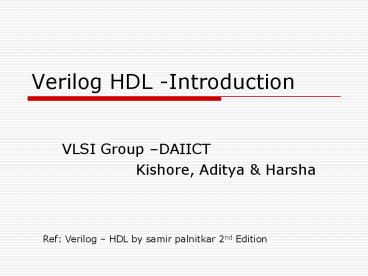Verilog HDL -Introduction - PowerPoint PPT Presentation
1 / 44
Title:
Verilog HDL -Introduction
Description:
Verilog HDL -Introduction VLSI Group DAIICT Kishore, Aditya & Harsha Ref: Verilog HDL by samir palnitkar 2nd Edition Module- Basic building block Levels of ... – PowerPoint PPT presentation
Number of Views:267
Avg rating:3.0/5.0
Title: Verilog HDL -Introduction
1
Verilog HDL -Introduction
- VLSI Group DAIICT
- Kishore, Aditya Harsha
Ref Verilog HDL by samir palnitkar 2nd Edition
2
Module- Basic building block
A module can be an element or collection of low
level design blocks
3
Levels of Abstraction-1
- Switch Level Module implemented with switches
and interconnects. Lowest level of Abstraction - Gate Level Module implemented in terms of logic
gates like (and ,or) and interconnection between
gates
4
Levels of Abstraction-2
- Dataflow Level Module designed by specifying
dataflow. The designer is aware of how data flows
between hardware registers and how the data is
processed in the design - Behavioral Level Module can be implemented in
terms of the desired design algorithm without
concern for the hardware implementation details.
Very similar to C programming
5
Hierrarchy
6
Basic Concepts
- Number is specified as
- ltsizegt'ltbaseformatgtltnumbergt
7
Contd.
8
Nets
- Nets represent connections between hardware
elements. Just as in real circuits, nets have
values continuously driven on them by the outputs
of devices that they are connected to.
9
Registers
- Registers represent data storage elements.
Registers retain value until another value is
placed onto them. - In Verilog, the term register merely means a
variable that can hold a value. - Unlike a net, a register does not need a driver.
10
Vectors
- Arrays of Regs and Nets
11
Integers and Parameters
12
Ports
- Ports provide interface for by which a module can
communicate with its environment
13
Module
14
Port connection rules
15
Example
16
Connecting Ports
- Suppose we have a module
17
(No Transcript)
18
Gate Level Modeling
- A logic circuit can be designed by use of logic
gates. - Verilog supports basic logic gates as predefined
primitives. These primitives are instantiated
like modules except that they are predefined in
Verilog and do not need a module definition.
19
Gate gate_name(out,in1,in2)
20
Buf/not gates
- Buflnot gates have one scalar input and one or
more scalar outputs.
21
Bufif/notif
22
Instantiation of bufif gates
23
Design of 41 Multiplexer
24
Contd..
25
(No Transcript)
26
Stimulus
27
(No Transcript)
28
4 bit full adder
29
Declaration
30
Code contd..
31
4 bit adder using 1 bit adder
32
(No Transcript)
33
Stimulus
34
Gate Delays
- Rise Delay Delay associated with a o/p
transition to 1 from any value. - Fall Delay Delay associated with o/p
transition to 0 from any value. - Turn off Delay Delay associate with o/p
transition to Z from another value.
35
(No Transcript)
36
Dataflow Modeling
- In complex designs the number of gates is very
large - Currently, automated tools are used to create a
gate-level circuit from a dataflow design
description. This process is called logic
synthesis
37
Continuous Assignment
38
Rules
- The left hand side of an assignment must always
be a scalar or vector net - It cannot be a scalar or vector register.
- Continuous assignments are always active.
- The assignment expression is evaluated as soon as
one of the right-hand-side operands changes and
the value is assigned to the left-hand-side net.
39
- The operands on the right-hand side can be
registers or nets. - Delay values can be specified for assignments in
terms of time units. Delay values are used to
control the time when a net is assigned the
evaluated value
40
(No Transcript)
41
Operator Types
42
(No Transcript)
43
Conditional Operator
44
41 Multiplexer Example































